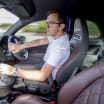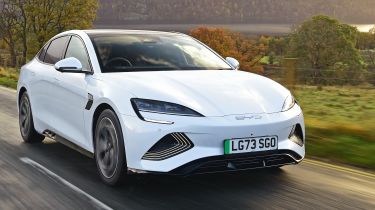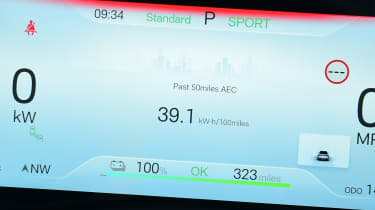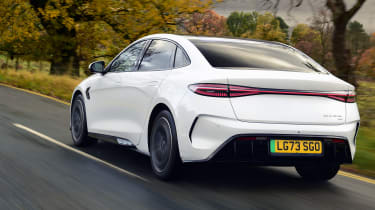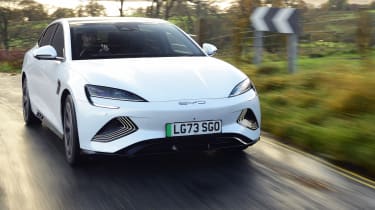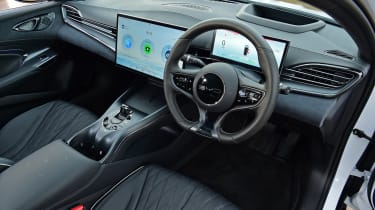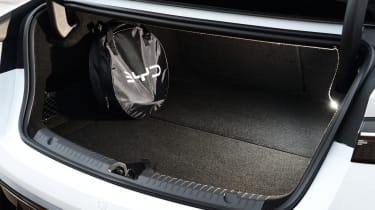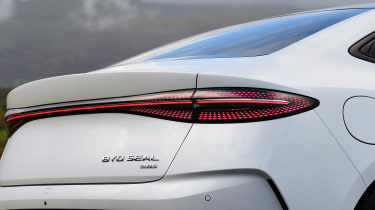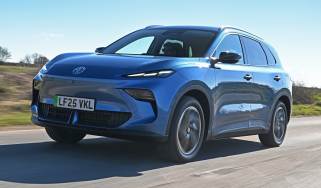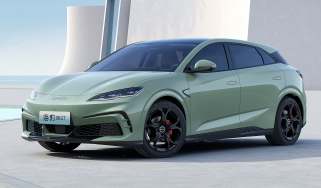BYD Seal review: Chinese brand is riding a wave of success
BYD’s saloon offers an intriguing alternative to the Tesla Model 3, with a funky interior and a surprisingly decent driving experience
Pros
- Loud, yet luxurious interior
- Good to drive
- Decent passenger space
Cons
- Narrow boot opening
- Rotating screen a gimmick
- Expensive to run and insure
BYD Seal verdict
The BYD Seal needs to be very good to complete in a sea of such strong rivals. BYD has certainly risen to the challenge, however, as there’s plenty to like about the Seal. Certainly a highlight is its well-appointed interior that, besides a handful of questionable material choices, stands above many well known rivals in terms of design and luxury feel. BYD’s tech offering is also worth mentioning as, while the rotating touchscreen is certainly a gimmick, the infotainment system is incredibly responsive, if a bit dim in broad daylight. Keen drivers should look elsewhere, but few alternatives do the comfy cross-country cruiser schtick quite as well as the Seal.
Details, specs and alternatives
BYD – otherwise known as Build Your Dreams – is a Chinese manufacturer that’s often billed by some as ‘the biggest car maker you’ve never heard of’, even beating Tesla in terms of the number of new EVs it sold in 2023.
After making a splash here in the UK in 2022 with the BYD Atto 3 SUV and then again in 2023 with the penny-pinching BYD Dolphin supermini, the brand now wants to be taken as a serious player in the EV game and it intends to do so with this: the BYD Seal, a rival to the likes of the Tesla Model 3, Hyundai Ioniq 6 and Volkswagen ID.7.
While a nameplate such as ‘Seal’ is certain to raise at least a few eyebrows, the BYD saloon nevertheless appears to be a genuine contender on paper. All versions currently on sale in the UK get a rather large 82.5kWh battery pack which, depending on which variant you choose, is enough for 354 miles on a single charge – 50 miles less than what’s possible in a Polestar 2, yes, but about the same as a BMW i4.
There are two specifications to choose from: Design and Excellence AWD. The former gets a rear-mounted electric motor producing 309bhp, while the latter gets – as its name suggests – an additional electric motor on the front axle to provide all-wheel drive and an elevated power output of 523bhp.
As you’d hope from a £45,000 electric car from a somewhat unfamiliar brand, standard equipment is suitably generous. All cars get full LED exterior lighting, a rather larger 15.6-inch rotating touchscreen – more on that later on – quilted leather upholstery, heated and ventilated front seats, a panoramic glass roof, adaptive cruise control, blind-spot monitoring and a 360-degree camera system.
Range, battery size & charging
|
Model |
Range |
Wallbox charge time |
Rapid charge |
|
Design |
354 miles |
9.5hrs est. (0-100%, 7kW) |
26mins (30-80%, 150kW) |
|
Excellence | 323 miles | 9.5hrs est. (0-100%, 7kW) | 26mins (30-80%, 150kW) |
As mentioned, a 82.5kWh battery pack is standard fare in the BYD Seal. In the rear-driven Design model, this is enough for a maximum of 354 miles on a charge. Upgrade to the dual-motor Excellence model and this figure drops slightly to a still-decent 323 miles. Of course, as is the case with all EVs, this is a best-case scenario estimate; a standard-fit heat pump should help the BYD get as close as possible to its maximum range in the colder months, and even on our wet and windy drive of the dual-motor Seal, it was still showing a healthy 200 miles of range at 65% charge.
Speaking of charging, the BYD Seal offers a maximum DC ultra-rapid rate of 150kW. Find a suitable public charger and a 30-80 per cent charge is possible in 26 minutes; while this might seem rather good, it’s worth noting that many of the BYD’s rivals offer faster charging speeds. For example, plug a Model 3 Long Range into one of Tesla’s fantastic V4 Superchargers and a more substantial 10-80% top-up can be completed in just 27 minutes.
Running costs & insurance
As an electric car, the BYD Seal enjoys several benefits over its petrol-powered executive-car alternatives. For example, all EVs are zero-rated for road tax until 2025 and occupy the lowest 2% Benefit-in-Kind bracket for company car tax. You can also, for the time being, enter London’s Congestion Charge zone for free, as well as the City’s Ultra-Low Emissions Zone (ULEZ).
Problems begin to arise when you consider the size of the Seal’s battery pack. Given its rather large capacity, a full charge might set you back more than you might expect; a full charge at home at the current average electricity rate under the energy price guarantee will cost you around £25, whilst plugging into a public DC rapid charger for an equal charge could set you back around £65. Both methods are certainly cheaper than filling up a combustion-engined saloon with petrol or diesel, but the difference may not be as great as some might perhaps be hoping.
The Seal will also be rather expensive to insure; given its lofty power output and seemingly endless tech offering, even the base Seal Design occupies insurance group 48, while Excellence models sit in the highest group 50. The Tesla Model 3 will almost certainly incur similarly high insurance premiums, but a Hyundai Ioniq 6 or Volkswagen ID.7 are both more shrewd choices if you don’t have a no-claims bonus or are deemed a ‘high risk’ driver.
Performance, motor & drive
|
Model |
0-62mph |
Top speed |
Driven wheels |
Power |
|
Design |
5.9s |
111mph |
Rear |
309bhp |
|
Excellence | 3.8s | 111mph |
Four | 523bhp |
Thanks to brands such as Tesla, electric cars have garnered a reputation for offering blistering acceleration that has the potential to embarrass even the latest petrol sports cars in a drag race. While this isn’t necessarily the case for all EVs – the majority offer punchy acceleration at the low end, which tapers off as you continue to accelerate – the BYD Seal provides strong performance across the board, even in single motor form.
It’s the top-spec Excellence model which offers the most neck-snapping acceleration; in fact, during our time with the car, we were able to beat BYD’s own performance figures, recording a 0-62mph time of just 3.7 seconds. Furthermore, the added grip of an additional electric motor on the front axle means the BYD is rather enjoyable to drive, too, with a firm suspension setup contributing to the Seal’s rather impressive body control on a twisty road.
Of course, there is some trade-off for this; the BYD Seal can fidget over bumps, but things tend to improve at higher speeds. Things are nowhere near as uncomfortable as in the Polestar 2, either. We also think that, despite the BYD’s aerodynamic shape there is a little too much wind noise for our liking.
Interior, dashboard & infotainment
Undoubtedly what makes BYD cars stand out from the competition is their luxuriously-appointed interiors. However, given the BYD Seal already occupies the premium electric saloon class, we were curious as to whether its cabin would stand out in the same way as the smaller BYD Dolphin's does in the small car class.
We’re pleased to report, however, that the BYD Seal certainly impressed us in this area. Some may not be all too taken by BYD’s funky design choices, but we’re fans of them here at DrivingElectric. We particularly like the Tahitian blue leather option that’s standard fare on all models, although traditional black leather is also an option. Material quality is also strong, although some choices do let the Seal down, including the brittle plastic used for the door handles – a bizarre choice, especially given how frequently these are touched.
Regardless, the main focus is almost certainly the Seal’s rotating centre touchscreen. To be honest, the rotating feature is more of a gimmick to impress your friends which you’ll probably leave alone the majority of the time. That’s no bad thing, though, as the system itself is lightning-fast to respond to your inputs and gets wireless Apple CarPlay and Android Auto as standard. Our only criticism is that we wish the screen could get a little brighter; even with maximum brightness enabled, the display appeared somewhat dim on a relatively overcast day.
Boot space, seating & practicality
|
Length |
Width |
Height |
Boot space |
|
4,800mm |
1,875mm |
1,460mm |
400 litres |
You might be led to believe, given the BYD Seal’s slinky shape, that practicality may be compromised for the rear passengers. Thankfully, this is not the case; we found the rear to be perfectly adequate for two six-foot adults – despite the panoramic glass roof impeding headroom slightly – with plenty of space on the flat floor for your feet and decent under-thigh support.
Unfortunately, though, while some rivals such as the BMW i4 and Volkswagen ID.7 get hatchback bootlids to aid practicality, the Seal has to make-do with a traditional saloon boot opening. The result of this is a rather large boot that feels somewhat compromised; the small opening means it can be difficult to slide larger items inside, which is also the case for rivals like the Hyundai Ioniq 6 and Tesla Model 3.
Reliability & safety rating
BYD might be an unknown brand here in the UK, but it’s known in other parts of the world for manufacturing the majority of the batteries found within our smartphones. This being the case and the Seal being a battery electric car, BYD’s reliability should be strong. In fact, the brand offers all of its cars with a long five-year warranty, showcasing its confidence in its products.
In terms of safety, Euro NCAP recently awarded the BYD Seal a full five-star safety rating after it underwent its notoriously stringent testing regime. All Seal models come loaded with active safety features including autonomous emergency braking, lane-keep assist, blind spot monitoring, hill start assist, driver attention monitoring and a 360-degree camera system. There’s also a door opening warning system which utilises the blind spot cameras in order to detect whether you’re about to open your door into an oncoming car, cyclist or pedestrian.
